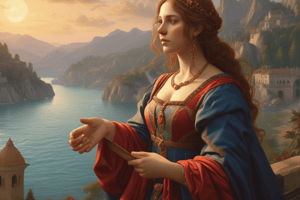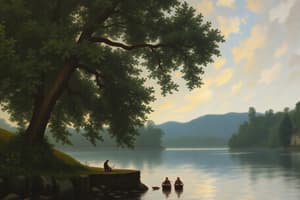Podcast
Questions and Answers
What does the Renaissance refer to?
What does the Renaissance refer to?
The Renaissance was a period when people began to criticize the church and combine faith with humanism.
What are the key ideas or values of the Renaissance?
What are the key ideas or values of the Renaissance?
Focus on human potential and achievements, questioning the church, and emphasizing individual ideas.
What civilizations influenced the Italian Renaissance?
What civilizations influenced the Italian Renaissance?
Rome and Greece.
What defines a 'Renaissance man'?
What defines a 'Renaissance man'?
What is the role of a patron in the arts?
What is the role of a patron in the arts?
What is the purpose of 'The Prince' written by Machiavelli?
What is the purpose of 'The Prince' written by Machiavelli?
What were the main causes of the Reformation?
What were the main causes of the Reformation?
What corruption did Martin Luther primarily criticize?
What corruption did Martin Luther primarily criticize?
Who is Martin Luther and what document is he known for writing?
Who is Martin Luther and what document is he known for writing?
How did the printing press aid Martin Luther?
How did the printing press aid Martin Luther?
What beliefs did John Calvin promote in his new religion?
What beliefs did John Calvin promote in his new religion?
Why did Henry VIII branch off from the Catholic Church?
Why did Henry VIII branch off from the Catholic Church?
Flashcards are hidden until you start studying
Study Notes
The Renaissance
- Definition: A period of cultural and intellectual flourishing in Europe, marked by a renewed interest in classical learning and a shift towards humanism.
- Key Ideas: Humanism, individualism, a focus on human potential and achievements, and a renewed interest in art, literature, and science.
- Causes: Decline of the medieval feudal system, growth of trade and urban centers, rediscovery of classical texts, patronage of the arts by wealthy individuals and families.
- Humanism: Focused on human potential and achievements, emphasized reason, observation, and individual experience. A shift from a solely religious worldview to one that incorporated human values and concerns.
- Italian Renaissance: Inspired by classical Roman and Greek civilizations as a way to reclaim their lost culture.
- Renaissance Man: A well-rounded individual skilled in various fields, with a balanced education and a mastery of art, science, and humanities. Leonardo da Vinci is considered the ideal Renaissance man.
- Patron: A person who financially supports the arts, often by commissioning works of art, providing funding to artists, or sponsoring artistic projects.
The Reformation
- Causes: Church corruption, including the sale of indulgences, the rise of humanism, the growing power of secular rulers, and theological disputes.
- Martin Luther's Criticism: The central corruption he attacked was the sale of indulgences. He believed that salvation comes through faith alone, not through good works or indulgences.
- Martin Luther: A German theologian who published his "95 Theses" criticizing the church's practices. His teachings led to the development of Lutheranism, a new branch of Christianity.
- Martin Luther and The Printing Press: The invention of the printing press allowed for the mass-printing of Luther's writings, spreading his ideas throughout Europe.
- John Calvin: A French theologian who developed Calvinism. Calvin believed in predestination, the idea that God has already chosen who will go to heaven. He also emphasized the importance of the Bible and a strict moral code.
- Henry VIII and the Church of England: King Henry VIII broke away from the Catholic Church when the Pope refused to grant him an annulment from his marriage to Catherine of Aragon. He established the Church of England, a new Protestant church.
Studying That Suits You
Use AI to generate personalized quizzes and flashcards to suit your learning preferences.




